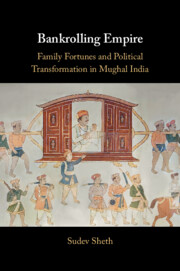Book contents
- Bankrolling Empire
- Bankrolling Empire
- Copyright page
- Dedication
- Contents
- Figures
- Maps
- Tables
- A Note on Translations, Transliterations, and Dates
- Acknowledgments
- Mughal Family Tree
- Jhaveri Family Tree
- Gaekwad Family Tree
- Haribhakti Family Tree
- Introduction
- 1 Prelude: The Mughal Empire, 1526–1750
- 2 Courtly Mutualism: The Emperor’s Jeweler Shantidas Jhaveri, 1628–58
- 3 Political Commensalism: Manekchand Jhaveri and Bankrolling Bids to the Throne, 1658–1707
- 4 Interlude: Cultivating Financial Crisis under Aurangzeb, 1660s–1719
- 5 Expedient Extortion: The Governor’s Golden Goose Khushalchand Jhaveri, 1719–30
- 6 Competitive Coparcenary: Vakhatchand Jhaveri and Brokering Politics, 1730–1818
- 7 Postlude: Bankrollers of Mughal Succession, 1750–1818
- Conclusion
- Book part
- Glossary
- Bibliography
- Index
6 - Competitive Coparcenary: Vakhatchand Jhaveri and Brokering Politics, 1730–1818
Published online by Cambridge University Press: 16 November 2023
- Bankrolling Empire
- Bankrolling Empire
- Copyright page
- Dedication
- Contents
- Figures
- Maps
- Tables
- A Note on Translations, Transliterations, and Dates
- Acknowledgments
- Mughal Family Tree
- Jhaveri Family Tree
- Gaekwad Family Tree
- Haribhakti Family Tree
- Introduction
- 1 Prelude: The Mughal Empire, 1526–1750
- 2 Courtly Mutualism: The Emperor’s Jeweler Shantidas Jhaveri, 1628–58
- 3 Political Commensalism: Manekchand Jhaveri and Bankrolling Bids to the Throne, 1658–1707
- 4 Interlude: Cultivating Financial Crisis under Aurangzeb, 1660s–1719
- 5 Expedient Extortion: The Governor’s Golden Goose Khushalchand Jhaveri, 1719–30
- 6 Competitive Coparcenary: Vakhatchand Jhaveri and Brokering Politics, 1730–1818
- 7 Postlude: Bankrollers of Mughal Succession, 1750–1818
- Conclusion
- Book part
- Glossary
- Bibliography
- Index
Summary
Chapter 6 traverses the aftermath of Mughal rule as members of the Maratha confederacy, led by the Gaekwads, and officials of the early colonial state in the form of the British East India Company sought to capture Ahmedabad and strategic routes connected to the city. It was in this context that the sons of Khushalchand, Nathushah (1720–1793) and Vakhatchand (1740–1814), became entrenched in financing new forms of political organization by guaranteeing loans to groups seeking the purchase of revenue farms from emerging stately authorities. I call this phase of political-business relations competitive coparcenary. By becoming speculators in land revenue farms and advancing capital to those seeking to establish state power, the Jhaveris tactfully adapted their expertise to new political circumstances. This was a major departure from the high tide of Mughal rule in the seventeenth century when power manifest through warfare. Now, principles of the market and revenue sharing diplomacy became the hallmark of political organization, and the later Jhaveris were central to such emerging diplomacy.
Keywords
- Type
- Chapter
- Information
- Bankrolling EmpireFamily Fortunes and Political Transformation in Mughal India, pp. 223 - 260Publisher: Cambridge University PressPrint publication year: 2023

